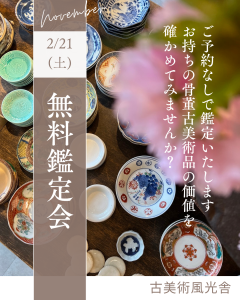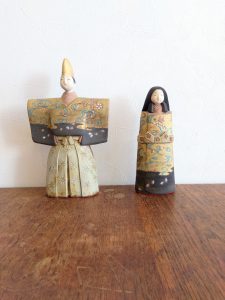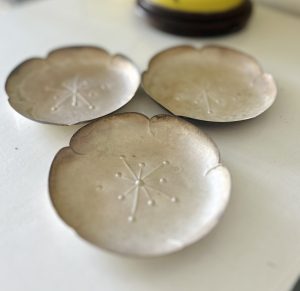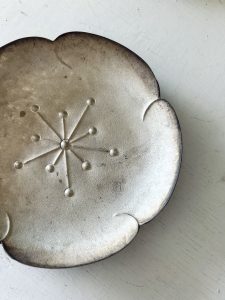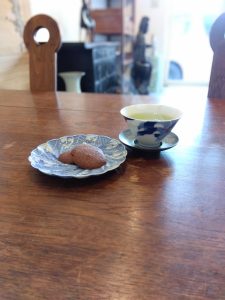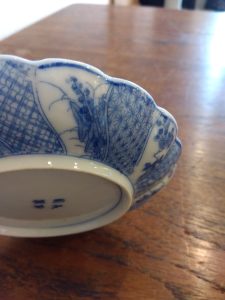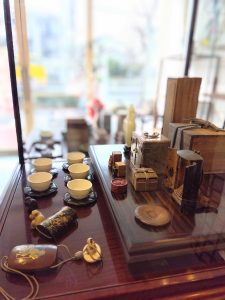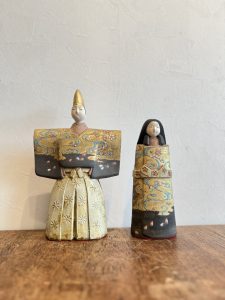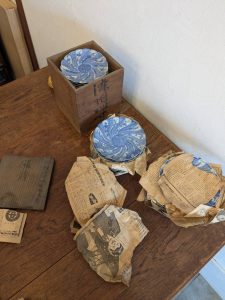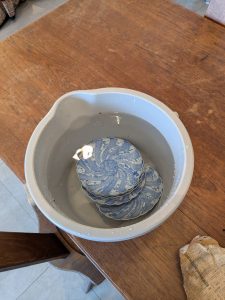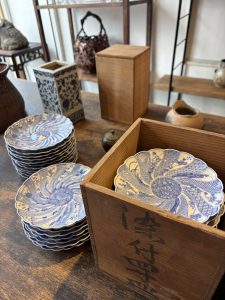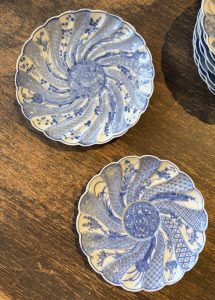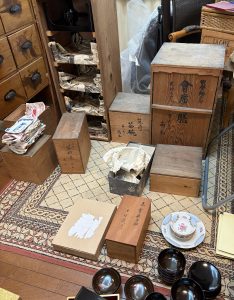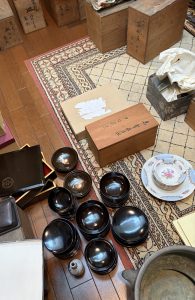狙ったわけではなかったが、犬山城へ(愛知県名古屋市千種区姫池通 骨董買取 古美術風光舎)
2026.02.19
先日の大河ドラマ「豊臣兄弟!」
寝返った鵜沼城の城主大沢次郎左衛門が城をあけ渡し、信長が「いよいよ犬山城か…!」と、いったシーンで終わったのですが、そういえば先日ちょうど犬山に友人とランチに行く約束をしていまして。
狙ってこの時期にしたわけではなかったのですが、たまたまとはいえ、自分も「いよいよ犬山城か…」の信長みたいな気持ちそのままで犬山、そして犬山城へいってまいりました。
お天気サイコーでして、腕前いまいちのカメラマンFでもなんとか綺麗に撮れました。

 土塁も残っています
土塁も残っています
犬山城といえば、全国に12しかない現存天守のひとつでして、しかも、1601(慶長5)年築で現存最古(諸説あり)の天守であります。こちらの建物自体は信長時代ではないのですが、最上階まで登ると鵜沼城、伊木山城との位置関係がよくわかります。
木曽川を挟んで南岸が尾張、北岸が美濃。犬山城はその南岸に立つまさに境目の城でして、対岸にはさきほどドラマ内で秀吉が人質となり、城主の大沢次郎左衛門(松尾諭)を説得しようとした鵜沼城。さらにもうひとつ伊木山城もあります。伊木山城のさらに右奥には、当時、美濃を領していた斎藤家の本城、稲葉山城のシルエットも見えており、どの城跡も目視できるので、その近さがまさに戦国の世のバチバチした緊張感のある関係性であることを物語っています。

その中でも犬山城は木曽川にせり出す断崖上に立っており、まさに難攻不落の城といった佇まい。眼下の木曽川の流れをはさんで犬山城が丸見えでいて標高差があるので上からすべてを見下ろす格好になっています。これなら犬山城内の動きが手に取るようにわかったのでしょうし、城攻めのための陣を敷くのには理想的な立地だといえます。
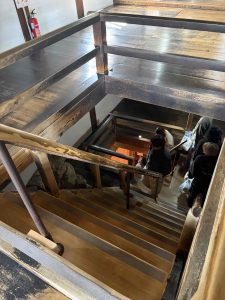
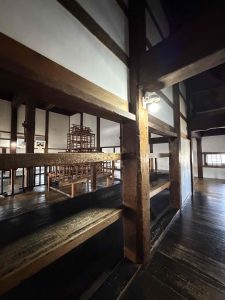
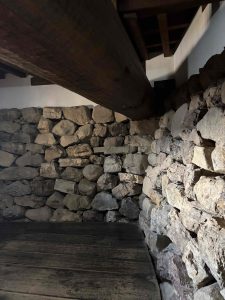
天守の中も戦国時代の城、戦いに備えた城といった佇まいです。実は、平日だったにもかかわらず天守最上階は昇降の人で列ができており、週末や祭日は入城するまでの列ができているようです。ちなみに階段の傾斜は先日訪れた丸岡城よりは急ではありませんでした笑。
そんなつもりではなかったのですが、大河ドラマのまさにストーリーの最中のまさに現場ということで、気分はすっかり戦国武将に。いろいろ城を登ってるほうなのですが、天守に登りまわりを見渡すと、誰しも戦国武将の気持ちになれるナンバーワンの城だと自分は思いますので是非一度は登ってほしい城ですね。

それではごきげんよう。(スタッフY)
The recent historical drama “Toyotomi Brothers!”
It ended with the scene where Osawa Jirozaemon, the lord of Unuma Castle who had defected, surrendered the castle, and Nobunaga declared, “So it’s finally Inuyama Castle…!” Come to think of it, I had just made plans with a friend to go to Inuyama for lunch the other day.
It wasn’t planned for this time, but coincidentally, I ended up going to Inuyama and Inuyama Castle feeling exactly like Nobunaga did in that “Finally, Inuyama Castle…” moment. The weather was absolutely perfect, and even an amateur photographer like me managed to take some nice shots.
Earthen ramparts remain
Speaking of Inuyama Castle, it’s one of only 12 original castle towers still standing nationwide. Moreover, built in 1601 (Keichō 5), it’s the oldest surviving castle tower (though opinions vary). While the current structure itself isn’t from Nobunaga’s era, climbing to the top floor gives you a great view of the positions of Unuma Castle and Ikiyama Castle. The Kiso River divides the region, with Owari on the south bank and Mino on the north. Inuyama Castle stands precisely on the southern bank, a border castle. Across the river lies Unuma Castle, where Hideyoshi was held hostage in the drama and attempted to persuade its lord, Osawa Jirozaemon (played by Satoshi Matsuo). Further beyond is Ikigayama Castle. Further to the right and rear of Ikigayama Castle, the silhouette of Inabayama Castle, the main stronghold of the Saito clan who ruled Mino at the time, is also visible. The fact that all these castle ruins are visible to the naked eye truly conveys the intense, tense relationships of the Warring States period.
Among them, Inuyama Castle stands on a cliff jutting out over the Kiso River, embodying the very image of an impregnable fortress. The castle is fully visible across the flowing Kiso River below, and the elevation difference allows for a commanding view from above. This vantage point would have made the movements within Inuyama Castle perfectly clear, making it an ideal location for setting up camp to attack the castle.
Inside the keep, too, it has the feel of a castle from the Warring States period, a castle prepared for battle. Actually, even though it was a weekday, there was a line of people waiting to ascend to the top floor of the keep. On weekends and holidays, it seems there’s a line just to enter the castle grounds. By the way, the staircase wasn’t as steep as the one at Maruoka Castle I visited recently, lol.
I hadn’t intended it, but being right in the middle of the historical drama’s story, right at the actual location, I completely felt like a Sengoku warlord. I’ve climbed quite a few castles, but when you ascend the keep and look out over the surroundings, I truly believe this is the number one castle where anyone can feel like a Sengoku warlord. It’s definitely a castle I recommend climbing at least once.
Well then, take care. (Staff Y)
**********************
ご実家の整理やお片付けなどをされている方のご相談などが多くございます。
お片付けなどくれぐれもご無理のないようになさってくださいませ。
風光舎では古美術品や骨董品の他にも絵画や宝石、趣味のお品など様々なジャンルのものを買受しております。
お片付けをされていて、こういうものでもいいのかしらと迷われているものでも、どうぞお気軽にご相談下さいませ。
また風光舎は、出張買取も強化しております。ご近所はもちろん、愛知県内、岐阜県、三重県その他の県へも出張いたします。
まずは、お電話お待ちしております。
愛知県名古屋市千種区姫池通
骨董 買取【古美術 風光舎 名古屋店】
TEL052(734)8444
10:00-18:00 OPEN

